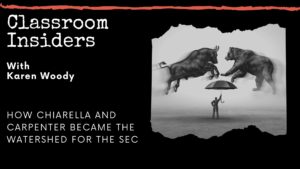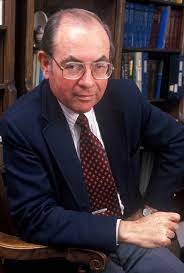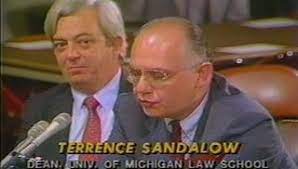OFAC issues updated FAQs on the Afghanistan sanctions regime to facilitate humanitarian aid.
Day: February 11, 2022

Lillian is a second-year student at Washington and Lee and will be working at a civil litigation firm. She plans to work in the field of civil law. In this episode of Classroom Insiders, Lillian discusses how the cases of Chiarella and Carpenter impacted the SEC, and insider trading regulations.
Chiarella came about when an employee of a financial printer company broke codes that concealed the names of companies involved in tender offers, then purchased shares from those companies before the bid was announced. In this case, Justice Powell introduced fiduciary duty as the reason individuals needed to disclose or abstain. Years before Chiarella, the SEC knocked down case after case of insider trading in favor of the government. Chiarella was Powell’s first opportunity to challenge the SEC’S policy of equal access, as well as crack down on the SEC’S attempt to broaden the interpretation of insider trading. Because Chiarella was not an employee, director, or officer of any of the companies whose stock was traded, there was no violation of securities law under that.
Misappropriation had a part to play in the case of Carpenter and The Wall Street Journal columns. Information on what dates and times certain columns that affected the stock market would be published were traded from Winans to his clients via Carpenter. Justice Powell himself requested to hear the case with the intention of dismissing misappropriation theory as a whole. Justices Rehnquist and O’Connor joined his descent but Powell retired before the case could be heard by him. This caused the Supreme Court to be split on whether misappropriation was valid for liability being imposed on Carpenter. In Powell’s memos, it’s stated that he wanted to reject the theory of misappropriation for insider trading under 10B5.
Resources
Karen Woody on LinkedIn
Super Sunday is here. The NFL finally gets the game in the spotlight after weeks of brutal PR. Who ya got? “Who Dey” or Hollywood? Tom and Jay are back look at some of the week’s top compliance and ethics stories this week in the Super Sunday edition.
Stories
1. Do compliance professionals need a union? Dick Cassin in the FCPA Blog.
2. Jailed employees under the FCPA. Bill Jacobsen explores in the FCPA Blog.
3. New workplace normal for policies and training. Ingrid Freeden in Risk and Compliance Matters.
4. New SOE risk management framework. Alexandra Gillies and Thomas Shipley in the FCPA Blog.
5. 3 questions from KPMG and Carillion tribunal. Neil Hodge in Compliance Week. (sub req’d)
6. SFO investigation protocol announced. Mengqi Sun in the WSJ Risk and Compliance Journal.
7. Companies yet again ask EU for rules around ESG. Lawrence Heim in practicalESG.
8. CCOs say self-reporting a hard sell. Evren Esen in CCI.
9. What comes next for ABC and the Olympics? Andy Spalding in GAB.
10. The Spotify imbroglio. Matt Kelly with a 2-parter in Radical Compliance, Part 1 and Part 2.
Podcasts and More
11. In February on The Compliance Life, I visit with Ellen Smith, a former Director of Trade Compliance who recently started her own consulting firm. In Part 1, she discussed her academic background and early professional career. InPart 2, Ellen moves in-house.
12. Tom and Richard Lummis begin their annual review of Best Picturing winning movies on 12 O’Clock High, a podcast on business leadership. In Part 1 they review Schindler’s List for leadership and ethical lessons. Upcoming episodes will look at Gladiator, A Man for All Seasons and Platoon.
13. CCI releases new e-book from Tom “FCPA 2021 Year in Review”. Available free from CCI.
14. Trial of the Century-the Enron Trial. This week, Tom premiered a 5-part podcast series on the Enron Trial with Loren Steffy, who covered the trial for the Houston Chronicle. In Part 1, run up to the trial. In Part 2, the trial begins. In Part 3, the star witnesses and key testimony. In Part 4, the Verdict comes in. In Part 5, what did it all mean. It is be available on the Compliance Podcast Network, Megaphone, iTunes, Spotify and all other top podcast platforms.
15. In a special 2-part series on the Sunday Book Review, Tom looks at the Notre Dame Deloitte Center for Ethical Leadership’s top books on ethical leadership from 2021. Part 1 and Part 2.
Tom Fox is the Voice of Compliance and can be reached at tfox@tfoxlaw.com. Jay Rosen is Mr. Monitor and can be reached at jrosen@affiliatedmonitors.com.
Farewell to Sandalow and Kamisar
It was a sad week for the University of Michigan School of Law and the greater academic and legal world this week. We lost both Yale Kamisar and Terrance Sandalow. Both were giants in the fields of legal education, academic research and writing and, perhaps most importantly, teachers. I was privileged to have taken courses from both when I was in law school.
About the only way I know to describe Yale Kamisar is that he was force of nature. He was also, according to his New York Times (NYT) obituary, the father of Miranda rights and Miranda warnings. He “began to wrestle with the issues of criminal procedure — the rules under which the legal system adjudicates crimes — in the late 1950s, as a newly hired faculty member at the University of Minnesota. At the time, the subject was considered largely a sideshow to the big questions in constitutional law.” Kamisar moved front and center into the debate on criminal procedural rights. According to Nancy J. King, who teaches criminal procedure at Vanderbilt University, “He made the subject matter. He created constitutional criminal procedure as a topic that demanded its own text, and as a field of study.”
The first of his writings to be cited by the US Supreme Court was in the 1963 decision in Gideon v. Wainwright, which established the right to legal counsel in criminal cases. The Court’s opinion was authored “by Justice Hugo Black, it was the first of more than 30 decisions over the next half-century to cite Professor Kamisar’s work.” Orin Kerr, a law professor at the University of California, Berkeley, said, “He was writing articles about what the court should do and what the court had done recently, and they were in turn citing him.”
 However, his “greatest impact on the court came in 1966, in its decision in Miranda. The year before, he had published a lengthy essay in which he compared the American legal system to a gatehouse and a mansion — the gatehouse being the police interrogation room and the mansion being the courtroom…In a decision written by Chief Justice Warren and citing Professor Kamisar’s work, it ruled in 1966 that criminal defendants had to be informed of their rights before being questioned, especially their rights to remain silent and to legal counsel.” Time Magazine wrote about him, “at 37, Kamisar has already produced a torrent of speeches and endless writings that easily make him the most overpowering criminal-law scholar in the U.S.”
However, his “greatest impact on the court came in 1966, in its decision in Miranda. The year before, he had published a lengthy essay in which he compared the American legal system to a gatehouse and a mansion — the gatehouse being the police interrogation room and the mansion being the courtroom…In a decision written by Chief Justice Warren and citing Professor Kamisar’s work, it ruled in 1966 that criminal defendants had to be informed of their rights before being questioned, especially their rights to remain silent and to legal counsel.” Time Magazine wrote about him, “at 37, Kamisar has already produced a torrent of speeches and endless writings that easily make him the most overpowering criminal-law scholar in the U.S.”
As a professor, he could be terrifying in class. Do not be the person he called on who was unprepared. If you wanted to challenge him, he certainly encouraged an open dialogue, but you better come prepared. He was as fine an example of the Socratic method as I ever experienced. Kara Brockmeyer, former head of the FCPA Unit at the Securities and Exchange Commission (SEC) and now partner at Debevoise & Plimpton LLP, said, “he was one of those professors you never forget. Scary, brilliant, impatient, and incredibly passionate about criminal law.” Classmate Mike Flanagan told me, “Professor Kamisar was a remarkably impressive person and an outstanding professor. He not only taught us “the law” and “how to think like lawyers”, he challenged us to understand the underpinnings of criminal law and criminal procedure, including the reforms that he played a key role in bringing about. I always knew that I was not cut out to be a criminal lawyer, but Professor Kamisar’s courses were my favorite courses in law school.”
Terrance Sandalow was the Dean of the Law School when I attended UMLaw. In his obituary in the Ann Arbor News, it noted he was “ member of the University of Michigan Law School faculty for 34 years, serving as dean from 1978 to 1987.” He was very different from Kamisar, yet that was one of the great strengths of UMLaw, the richness in diversity of its academic talent. Sandalow had clerked for Justice Potter Stewart before beginning his professional career. Like Kamisar, he began his academic career at the University of Minnesota Law School before joining the faculty of the UMLaw. “He was a strong supporter of the constitutionality of affirmative action, authoring the brief submitted to the Supreme Court in the 1975 Bakke case on behalf of the American Association of University Professors.”
 He was also academically rigorous, not focusing so much on the result but on the rigor of your opinions and research. That led him to testify for Robert Bork in his now famous Senate hearing in 1987. “Sandalow said that, while he disagreed with Bork on many issues, Bork was unquestionably qualified to serve and a refusal to confirm would further politicize the Court. Thirteen years later, Sandalow was fiercely critical of the Supreme Court’s ruling in Bush v. Gore, which halted Florida’s recount following the 2000 Presidential election. He called the ruling incomprehensible given the Court’s previous deference to states on election matters.”
He was also academically rigorous, not focusing so much on the result but on the rigor of your opinions and research. That led him to testify for Robert Bork in his now famous Senate hearing in 1987. “Sandalow said that, while he disagreed with Bork on many issues, Bork was unquestionably qualified to serve and a refusal to confirm would further politicize the Court. Thirteen years later, Sandalow was fiercely critical of the Supreme Court’s ruling in Bush v. Gore, which halted Florida’s recount following the 2000 Presidential election. He called the ruling incomprehensible given the Court’s previous deference to states on election matters.”
In the classroom Dean Sandalow was a very different style of teacher from Professor Kamisar. He was much more cerebral. I took a 14th amendment class from him, and we would often go down some deep legal and philosophical rabbit holes in reviewing this important Constitutional amendment. Yet it was equally intellectually satisfying as Professor Kamisar, even without the verbal fireworks. In fact, you really have not experienced a thoroughly free flowing exploration of Con Law until you heard Dean Sandalow lead a discussion of the Slaughter-House cases from the 1870’s presaging the Constitutional revolution in the 20thCentury. I still recall them to this day for that reason.
The UMLaw family lost two great members this week. I am sure they are actively debating issues in that great Moot Courtroom in the sky. Go Blue.
In today’s edition of Daily Compliance News:
- Credit Suisse had more training on how to talk and eat than on compliance. (FT)
- Rio Tinto and toxic culture. (Economist)
- After Clayton tried to decrease whistleblower awards, Gensler widens them. (WSJ)
- Is Roger Ng a scapegoat, rogue employee or active fraudster. (Reuters)





